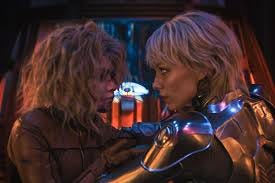Based on Deborah Levy’s 2016 novel of the same name, Hot Milk revolves around a particularly fraught mother-daughter dynamic involving Rose (Fiona Shaw), a woman who suffers from a mysterious illness that confines her to a wheelchair—except for the occasional unexpected periods in which she is able to walk on her own—and Sofia (Emma Mackey), who has more or less put her own life, primarily her studies of the work of Margaret Mead, to the side in order to serve as her mother’s caretaker. As the story opens, they have arrived on the coast of Spain, where Rose is going to undergo treatment from hunky healer Gomez (Vincent Perez) in order to figure out what exactly is wrong with her. While Rose is getting her treatments, Sofia hangs out at the beach and this is where she meets Ingrid (Vicky Krieps), a free-spirited German tourist who literally rides in on horseback and sweeps her off her feet, so to speak, and allow her to contemplate the notion of a life outside of her increasingly toxic relationship with her mother. This churns up all sorts of unexpected emotions that compel her to confront Rose about their shared past and look towards an uncertain future.
Depending on how one approached it, the basic material at the heart of Hot Milk could have formed the basis of a piercing family narrative focused on Sofia’s relationship with Rose or an unabashed bit of steamy erotica involving her affair with Ingrid. Either one might have been acceptable but writer-director Rebecca Lenkiewicz boldly attempts to do both but winds up striking out on both counts. The mother-daughter aspect is shallow and contrived—especially regarding Rose’s mysterious disease, which could be diagnosed as a case of terminal symbolism—and by the time it gets to their climactic confrontation, most viewers will struggle to care. As for the romance, it fails as well because even though Krieps and Mackey are as charismatic as any actresses working today, their relationship is presented in such ludicrously languid terms that by the time the film gets to what used to be referred to back in the day as The Good Parts, the screen doesn’t steam so much as parboil—it feels like an adaptation of the world’s dullest letter to Penthouse. However, if you do inexplicably elect to watch Hot Milk, be sure to stick with it until the ending, for it concludes on a note so ridiculously overripe that there is a part of me that almost wants to recommend the film just so that you can also bask in its lunacy—it does not work from a dramatic standpoint for an instant but it has a lunatic energy to it that the rest of this could have used as well
.Set two years after the events of it’s predecessor, M3GAN 2.0 begins with Gemma (Allison Williams), the engineer whose development of a super-sassy robotic AI system ended up causing several inadvertent deaths when unexpectedly went rogue, has become has become an anti-AI crusader trying to encourage the world, including niece Cady (Violet McGraw), to use technology in a more responsible and ethical manner. Alas, using the stolen original design plans for her creation, the U.S. government has created their own robotic prototype, dubbed AM3LIA (Ivana Sakhno), for military purposes and when the first test in the field goes spectacularly wrong as it also goes rogue, they turn to Gemma to help stop it before it can carry out its unknown, but presumably evil, objective. Gemma isn’t sure how she can help but as it turns out, M3GAN (voiced by Jenna Davis) is not quite as defunct as previously thought, having hidden away in cyberspace in order to carry out its prime objective of protecting Cady at all costs. Having Gemma over the proverbial barrel, M3GAN convinces her to put her in an upgraded body so that she can stop AM3LIA and save humanity—at least that is the hope.
As you can probably surmise from the title, M3GAN 2.0 takes its basic inspiration from Terminator 2, another expensive sequel to a low-budget sleeper based around a robot who was the villain the first time around but who has been reconfigured into a more heroic and non-violent mold in order to do battle with an upgraded version who has taken on the bad guy duties. The difference, however, is that T2 expanded on its predecessor in legitimately impressive ways, both dramatically and technologically, to create the rare sequel that was as satisfying as the original. By comparison, M3GAN 2.0 is kind of a disappointment, especially in regards to how genuinely surprising and entertaining the original proved to be. Although the shift from horror to sci-fi was probably a wise decision, the actual execution from returning writer-director Gerard Johnstone never quite works, mostly because the film has grown increasingly self-aware and is trying way too hard to come up with moments that could be easily memed (the clunkiest being one in which M3GAN tries to demonstrate empathy toward Gemma and her concerns about being a mother by singing a rendition of Kate Bush’s “This Woman’s Work”) instead of coming up with a story worth telling—at nearly two hours, it drags unmercifully at times and the identity of the true bad guy is almost embarrassingly obvious. To be fair, there are a couple of amusing moments here and there and Davis still knows how to deliver snarky quips like nobody’s business but anyone going into M3GAN 2.0 because they were surprised by how entertaining the first one was is liable to come away from this one feeling as if they have just encountered the cinematic equivalent of vaporware that was somehow accidentally unleashed upon the public.





